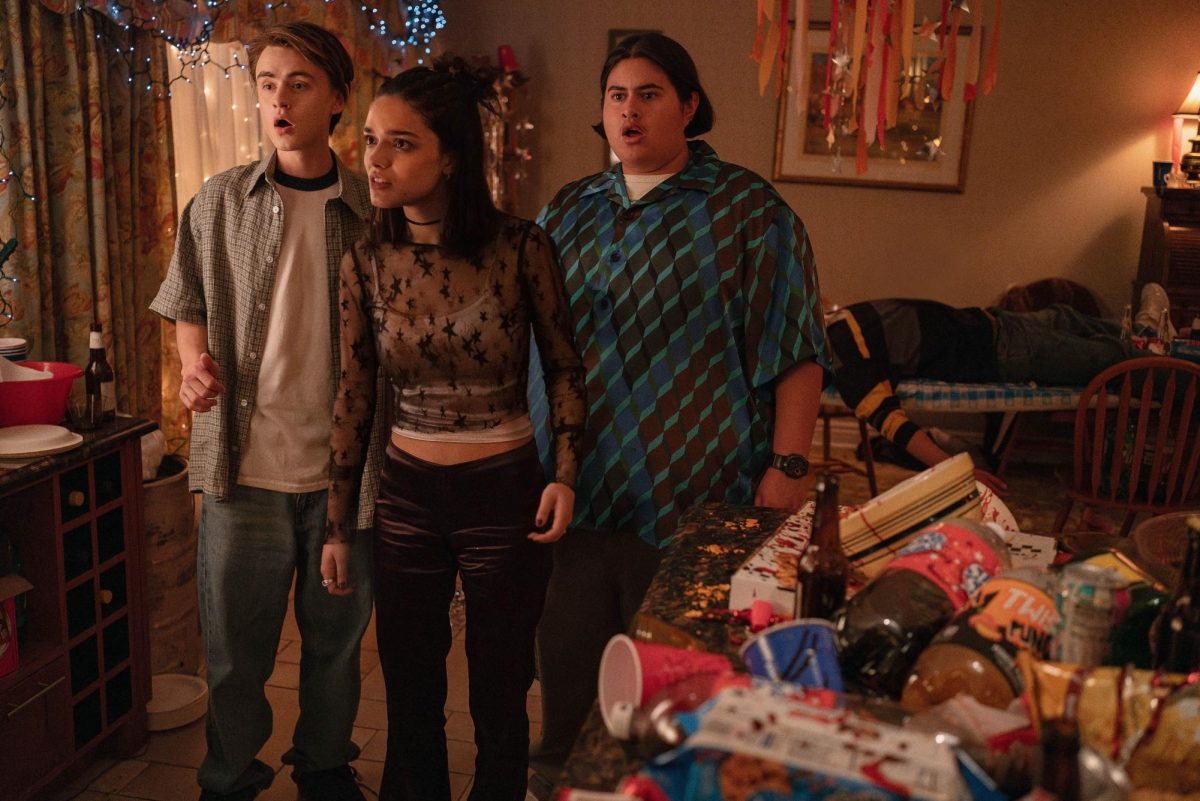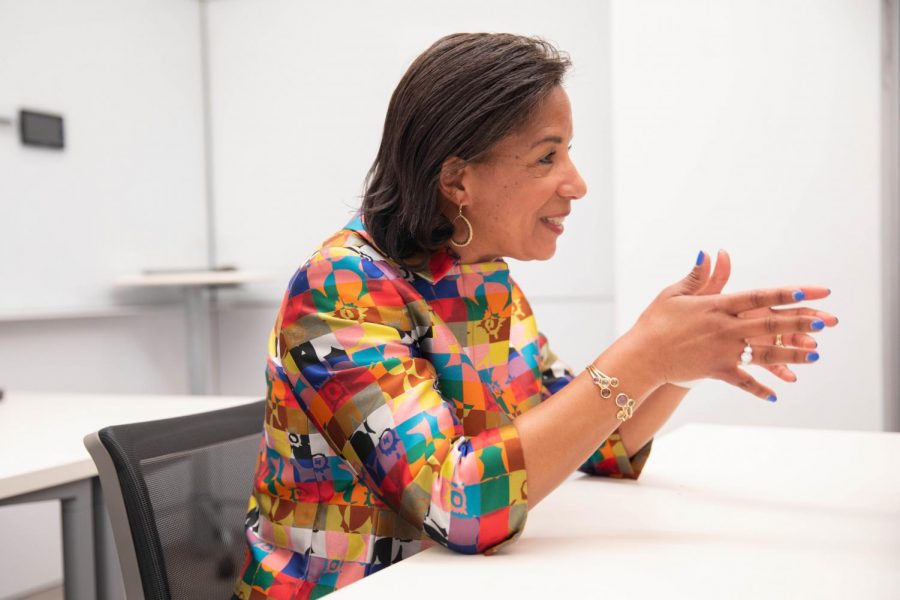Kyle Mooney, the versatile comedian, actor, screenwriter and director, is making waves once again with his latest venture, “Y2K.” The A24 film, released on Dec. 6, marks a significant step in Mooney’s career as he transitions from his celebrated acting roles on “Saturday Night Live” and “Zoolander” to writing and directing feature films. Produced in collaboration with Jonah Hill’s Strong Baby Productions — renowned for hits like “Mid90s” — “Y2K” is already generating buzz for its unique blend of nostalgia and satire.
Mooney’s “Y2K” starts as a nostalgia-packed comedy, brimming with late-’90s pop culture references, but shifts into a chaotic, horror-infused romp when the Y2K bug turns electronics into deadly weapons. The film follows three teens, played by Jaeden Martell, Rachel Zegler and Julian Dennison, as they face an electronic apocalypse, blending dark humor with a gory spectacle reminiscent of “Gremlins.” While the humor initially leans on nostalgia, Mooney’s signature eccentricity shines in its anarchic second half, delivering a unique and over-the-top take on millennial fears.
In a recent roundtable interview, The Hustler joined other student journalists to delve into Mooney’s creative process, inspirations and thoughts on crafting this distinctively retro yet timely narrative.
Inspiration for the film’s concept
The idea for “Y2K” first came to Mooney on Jan.1, 2019, after a New Year’s Eve party. Reflecting on the “Year 2000 problem,” better known as the “Y2K” belief that the world was going to end the second the clock struck midnight on Jan. 1, 2000. Mooney was inspired to write a film about this being a real thing and teenagers in highschool experiencing it.
“I woke up and thought, ‘This could be a movie,’” Mooney said. “I’d always been a little obsessed with Y2K.”
Mooney then was asked about his own experience during the much-feared millennium countdown. As a teenager in high school, it was relatively calm, though not without some preparation.
“I was at home with a friend watching the MTV special. My mom was nervous, so she got some supplies, but we just hung out and watched the ball drop,” Mooney said.
Mooney said this movie had been in the works for a few years now, prompting a conversation about what his future in directing and screenwriting looks like. “Y2K” marks Mooney’s first time directing a film released on the big screen, and he reflected on his overall experience on the film, as well as his plans for future projects.
“For ‘Y2K,’ I was encouraged to be the director. I see myself continuing, though maybe with smaller-scale projects in the future,” Mooney said. “I enjoy acting, writing and directing my own words — it’s all rewarding. I could see myself directing again, but I’m not in a rush.”
Making of the film
Mooney said one of his favorite parts of creating “Y2K” was the production design and immersing himself in late-’90s culture. He conducted extensive research, watching YouTube videos and poring over photographs to capture the essence of the era.
“The video store set was such a fun space to work on because it’s so emblematic of the time,” Mooney said. “We wanted it to feel like a mix of all the video stores we remembered.”
Mooney also mentioned that some personal anecdotes in the movie are related to his childhood.
“One detail I loved [was that] Eli’s computer had a ‘Warped Tour’ sticker — the one I attended in high school,” Mooney said. “There’s a ‘Heart and Souls’ poster in the video store as a tribute to my mom.”
Mooney also highlighted the film’s use of practical effects, which he said were critical to creating the authentic feel of a late-’90s film.
“We wanted to make a movie that felt like something you’d see in theaters in 1999,” Mooney said. “Practical effects rule because there’s something tangible to them — the actors can respond to real robots. The two robot characters were actually humans in suits, which made a big difference.”
Reflecting on the themes of the film, Mooney connected the Y2K panic of the past with today’s anxieties around technology.
“There was a lot of fear and hysteria about Y2K — people thought computers wouldn’t handle the switch from ‘99 to ‘00,” Mooney said. “Back then, we weren’t as consumed by the internet as we are now. It wasn’t seen as the threatening factor it is today.”
When asked which characters he resonated with most, Mooney said he related to Eli and CJ for their struggles with self-expression and their love of underground hip-hop.
“In high school, I was really into underground hip-hop,” Mooney said. “With Eli, I also connect to his struggle with socializing and figuring out who he is. That feeling of not being entirely confident but still trying to find your place — it’s something I know well.”
The film also features appearances from ’90s icons Alicia Silverstone, who acted in Clueless, and Fred Durst, lead singer of Limp. Mooney explained the thrill and learning opportunity he experienced from working with both these actors.
“It’s always a bit intimidating working with seasoned professionals, but when you have actors who are that experienced, you know you’re in good hands,” Mooney said. “It’s a treat to observe and learn from them.”
Although “Y2K” is firmly rooted in nostalgia, Mooney noted how trends from past decades often focus on exaggerated stereotypes rather than authentic representations.
“When I was in college, the ’80s were having a comeback, but the fashion was very over-the-top — it didn’t represent all of the ’80s,” Mooney said. “It’s the same with the ’90s now. When I see big jeans, that’s not what I was wearing. These nostalgia cycles often lean into the most flamboyant parts of an era.”
Final reflections
As for sharing “Y2K” with younger audiences, Mooney admitted the experience has been deeply moving.
“It means so much — I can get emotional thinking about it,” Mooney said. “Meeting young people who connect with the film has been really special. Hearing that people are aware of my work and enjoy it — that really gets to me.”
The film concludes with a monologue that emphasizes the importance of stepping back from technology and embracing human connection, a message Mooney emphasized throughout the film.
“It’s so easy to forget that we’re all human, especially with the anger and hate we see online,” Mooney said. “Sometimes, we need to step back and remember that everyone we meet is probably dealing with something tough. It’s about opening your eyes, being kind and practicing empathy.”




